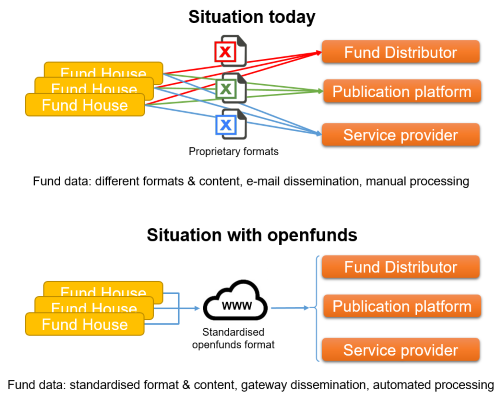openfunds: a global standard for the characterisation of investment funds
During recent years, the volume of data and speed of information transmission have increased dramatically across most industries. Although most business sectors have adapted to these developments through the adoption of standardised, globally-implemented data protocols, the financial industry has lagged behind.
This is particularly true when considering the interchange of complex and often lengthy static data which is used to characterise investment funds.

Static fund data refers to the large number of attributes used to characterise an investment fund such as Fund Group Name, Umbrella Name, Fund Name, Fund Currency, ISIN, Fund Manager, Fund Domicile, etc. Currently almost 200 fields may be required to characterise a single mutual fund, share class or ETF. Static data differs from dynamic data such as NAV price, performance or ratings which are subject to frequent change and are generally not disseminated with static data.
To improve this situation, the openfunds initiative provides an open, extensible and license-free standard for the characterisation of fund attributes. The goal of the openfunds initiative is to create a standard that improves the quality, speed and efficiency of the dissemination, interchange and validation of fund information globally.
Disseminating fund data: the situation today
Today, investment fund data is often sent from fund providers to their distribution partners in an anachronistic fashion: via Excel spreadsheets (see figure 1), whereby the content and format are specific to each distribution partner. This can lead to duplication and errors at the fund provider’s end given that the individual spreadsheets usually have to be created manually for each distributor.
Likewise, the current fields often leave room for interpretation. This results in inefficiencies, errors and ambiguities requiring reconciliation between fund providers and their distribution partners. Incomplete, ambiguous or erroneous fund data can have serious results which could negatively affect investors – they may choose not to invest in the fund.
The goal of the openfunds standard is to improve efficiency by eliminating potential sources of error and ambiguity during fund data interchange. openfunds does this by providing a common, normalised standard for fund characterisation which improves and facilitates the processing and exchange of fund data between fund houses and fund distributors. Investors ultimately benefit from increased transparency, reliability and improved ability to evaluate and compare investment funds.
The heart of openfunds: OF-identifiers
The openfunds standard offers a normalised, extensible set of clearly defined fund reference data with unique identifiers. These identifiers are referred to as “openfunds identifiers” – or “OF-IDs” for short. The standard is published online at http://openfunds.org/fieldmenu/fields/. The content of this website is published under a Creative Commons Licence and may be used by anyone free of charge.
An example of a fund OF-ID is shown below:
The format of all OF-IDs are the same:
- OF-ID: this is a unique 10-character alpha-numeric number associated with each OF-ID
- Field Name: the descriptive name of the OF-ID
- Field Tags: Each openfunds field may be tagged with one or more field tags like “Purchase Information”, “Taxes”, “KID” etc. With these it is possible to filter out all fields that are related to one topic with ease.
- Field Level: level that this OF-ID belongs to. In the above example, the OF-ID describes an attribute of a Fund. Other examples of field level could be “Umbrella”, “Company”, “Share Class”, etc.
- Link Reference: If a value change in one field leads to a change of a value in another field, the two fields are linked. If it is a loose link, openfunds calls the fields “dependent”, if it is strict, openfunds mark them as “linked fields”. More information can be found on http://openfunds.org/en/fieldtypology/
- Data Type: either a boolean (yes/no), date (YYYY-MM-DD), time (hh:mm), double (number with decimals), integer (number without decimals) or string (text) value
- Introduced with version: which version of openfunds this OF-ID first appeared
- Description
- Values: possible values for this OF-ID
- Examples
Please also refer to the white paper openfunds’ Conventions.
The complete and latest list of openfunds OF-IDs in PDF and Excel format can be found at:
http://openfunds.org/fieldmenu/fields/
- FAQs are available at: http://openfunds.org/en/knowledge/faq/
- White papers are available at: http://openfunds.org/en/knowledge/whitepapers/
- Terms and conditions for using the openfunds standard are outlined here: http://openfunds.org/en/licence/
- A quicklink to individual openfunds field descriptions can be found by using this URL syntax:
http://openfunds.org/<OF-ID>
Example: if you would like to link to openfunds description for “OFST160100 Legal Form”, just use the following hyperlink: http://openfunds.org/OFST160100
Who is behind openfunds?
Founded in 2017, openfunds is a non-profit, global association of financial institutions collaborating on a common industry standard for the interchange and dissemination of fund data.
Backers of the openfunds standard
These firms back the openfunds standard for fund data characterisation. They are or will soon be able to send and receive fund data files that comply with the openfunds standard.

Document information
| Title: | Hedging |
| Language: | English |
| Confidentiality: | Public |
Revision History
| Version | Date | Status | Notice |
|---|---|---|---|
| 1.1 | 2018-03-09 | Final | Updated Fig. 3 and minor text changes |
| 1.0 | 2016-05-10 | Final | First Version. |
Implementation
If you have any questions about the new data type or difficulties with implementation, please contact us at businessoffice@openfunds.org.
Joining openfunds
If your firm has a need to reliably send or receive fund data, you are more than welcome to use the openfunds fields and definitions free-of-charge. Interested parties can contact the openfunds association by sending an email to: businessoffice@openfunds.org
openfunds.org
c/o Balmer-Etienne AG
Bederstrasse 66
CH-8002 Zurich
Tel.: +41 44 286 80 20
Email: businessoffice@openfunds.org
If you wish to read or download this white paper as PDF, please click here.
